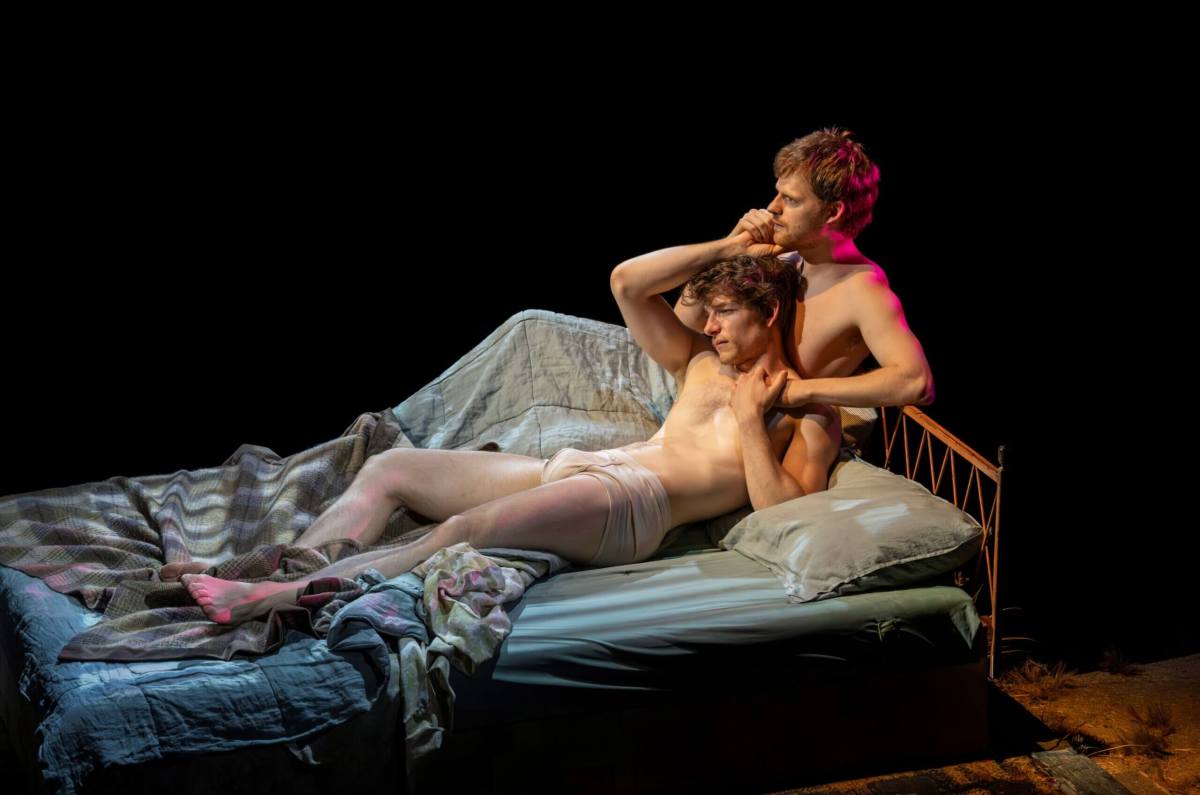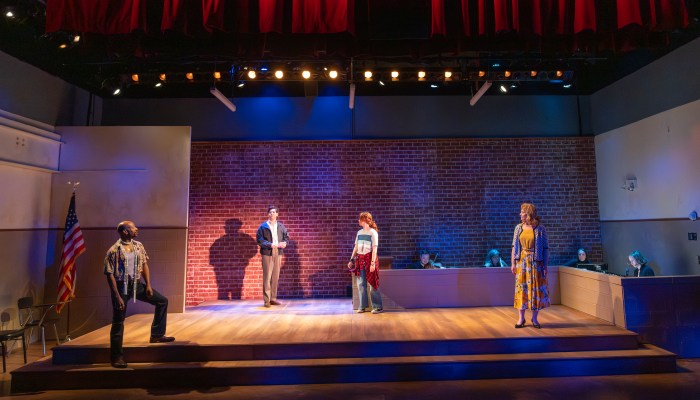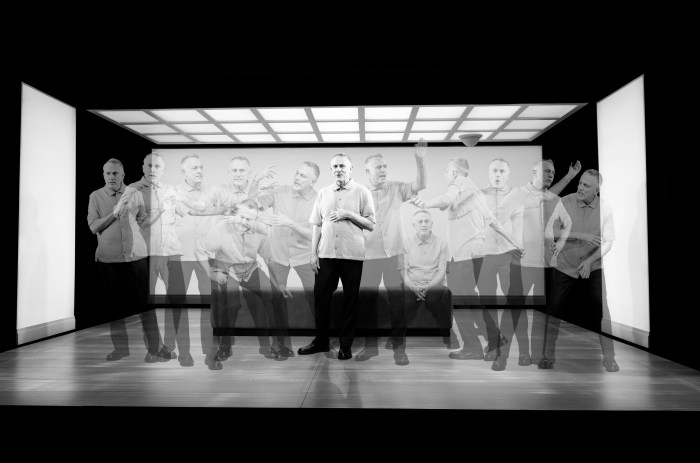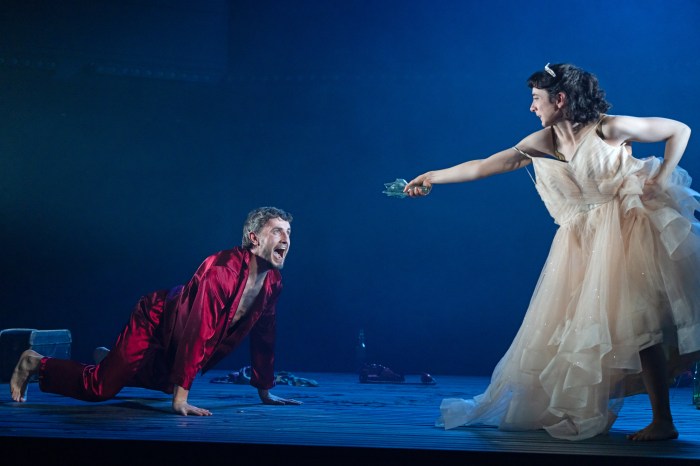The stage version of “Brokeback Mountain” is the gayest show in the London, but gay themes were popping up all over the West End: in a play about John Gielgud in 1964, a contemporary rom com about two older men who meet through their dogs, and even one about the first head of the BBC in 1926. While some of these shows are closed, others are getting transfers to the West End, with potential for New York, as well.
My best advice to those planning to take in theater in London is to explore what’s on at the National Theatre, the Royal Court, the Almeida, the Donmar, and the Finborough.
Now to the shows.
The “Brokeback” play directed by Jonathan Butterell stars Mike Faist as Jack and Lucas Hedges as Ennis — prominent movie actors to be sure (both having Oscar nominations), but not the matinee idols that Jake Gyllenhaal and Heath Ledger were when they did the Ang Lee movie in 2005, as able as they were in their roles.
Faist and Hedges are much closer to the wiry cowboys in 1963 Wyoming that Annie Proulx conceived in her 1997 story in The New Yorker. Without the mountain scenery, the play — by Ashley Robinson — focuses us in on the dynamics of their forbidden love: their joy at finding each other and being able to make love as nature intended for them and their pain at having to lead double lives. They break our hearts, too — and make us face the deadly violence to which they were subject. This version is given more emotional resonance through songs by Dan Gillispie Sells that are performed on stage (though not by the lead actors).
Coming at a time when our Supreme Court could reinstate anti-sodomy laws, has okayed some anti-gay discrimination, and when almost the entire Republican Party is bent on erasing LGBTQ people from public life, “Brokeback” couldn’t be more timely. (To Aug. 12 at Soho Place, but expect this one to make it America.)
“When Winston Went to War with the Wireless,” by Jack Thorne and directed by Sam Mendes at the Donmar Warehouse (to July 29), is a ripping piece of theater about how Winston Churchill, as Prime Minister Stanley Baldwin’s Chancellor of the Exchequer, tried to get the nascent BBC to tow the government line during the General Strike of 1926. Immensely theatrical, we’re in the room for the early days of radio as general manager John Reith (Stephen Campbell-Moore in an outstanding turn) tries to shape a new medium to elevate British society while establishing its editorial independence — a battle that continues to this day and is not sewn up neatly by this play.
Almost every great actor in the UK eventually plays Hamlet or Churchill, and this Winston is the always entertaining Adrian Scarborough, who captures the great man’s arrogance, pettiness, political skill, and even insecurity perfectly. And Haydn Gwynne (Olivier winner and Tony nominated as the music teacher in “Billy Elliot: The Musical”) give us a new perspective on Prime Minister Stanley Baldwin.
But the center of the play is Campbell-Moore’s tortured visionary Reith, a wounded WWI vet filled with almost religious fervor for his mission at the BBC. They don’t make them like this anymore. And the play delves deeply into how this pillar of society had a male lover — like the men of “Brokeback” wanting to fulfill his nature but only able to function in a homophobic society by entering into a duplicitous marriage with Muriel (Mariam Haque).
I learned a ton about this fraught episode of UK history and was given a lot to think about in terms of political interference in media — a favorite sport of autocrats worldwide.
Thorne also wrote “The Motive and the Cue,” the hit play at the National Theatre about the time Sir John Gielgud directed Richard Burton in a Broadway production of “Hamlet” when Burton had become a movie star and had just married Elizabeth Taylor (for the first time). Gielgud staged the “Hamlet” as a dress rehearsal and most of this play takes place in a big rehearsal room — and in the hotel rooms to which the cast and crew repair.
Out Mark Gatiss does an almost too good Gielgud, capturing his mellifluous voice and formal mannerisms and sparring with the rambunctious Burton, but becoming most revealing in a scene where he hires a male hustler. Gielgud’s homosexuality was no secret. Right after being knighted in 1953 he was arrested for having sex in a loo — an incident that almost ended his career and made him contemplate taking his own life (dramatized in Nicholas de Jongh’s fine “Plague Over England” in 2008). But by 1964 he has a male partner back in England. He takes this directing job because his own storied career as an almost peerless Shakespearean (Olivier was his equal and rival) has flagged.
Plays about the greats are challenged with demonstrating their greatness or at least charisma, and Johnny Flynn’s Burton and Tuppence Middleton’s Taylor don’t quite get there as written. But this play, while much less theatrical than Thorne’s “Winston” despite being a backstage drama, has won a West End transfer (Dec. 9 to March 23 at the Noël Coward) and may also end up crossing the pond. It is not a criticism to say I think it is ultimately going to work better as a screenplay than a stage show. More info here.
I couldn’t be much less interested in professional football (what we call soccer), but James Graham’s “Dear England” at the National’s big Olivier Theatre had me engaged from start to finish. It deals with the recent struggles of the English team in European and World Cup championships under their unique coach, Gareth Southgate (winningly and subtly portrayed by Joseph Fiennes), aided by psychologist Pippa Grange (Gina McKee). It is dedicated to the mental as much the physical side of the “beautiful game,” as it is known. The supporting players are mostly playing jocks (and the suits who administer the team), but the splendid supporting cast humanizes them at every turn.

Football is presented as central to the English psyche — from the English team’s historic capture of the World Cup in 1966 to disappointments ever since (except for the women’s team) — with Southgate playing key roles as player and coach in devastating near misses (Through Aug. 11).
“Dear England” transfers to the Prince Edward Theatre in the West End from Oct. 9 for 14 weeks.
The Royal Court Theatre continues its historic dedication to new works serving up Michael Wynne’s “Cuckoo” (to Aug. 19) in its larger house and Rabiah Hassain’s “Word Play” (to Aug. 26th) upstairs.
“Cuckoo,” directed by Vicky Featherstone, takes us into the kitchen of working class women — saucy grandma Doreen (Sue Jenkins) hosting her adult daughters — no nonsense Carmel (Michelle Butterly) and anxious Sarah (Jodie McNee) — and Carmel’s teen daughter Megyn (Emma Harrison, in arguably the title role). It’s a look at female family dynamics in a comedy-drama that turns on Megyn holing up in grandma’s bedroom and refusing to leave.
But who is “cuckoo” here? The play leaves that an open question, and in our troubled time, wonders aloud what a sane approach to the divisions in the world would be. While there’s plenty of conflict among the women — and expressions of insecurity — there is a love for each other that gets them through things.
“Word-Play,” directed by Nimmo Ismail, is a series of skits about how we use language — as hot a topic as there is these days — but the nimble, top notch troop of five actors playing multiple roles keep the show from becoming a polemic. Some scenes are comedic, such as the flailing communications staff of a prime minister discussing how to deal with his latest gaffe. Others are serious looks at issues of race, immigration, and citizenship. All are thoughtful.
“Grenfell: In the Words of Survivors” (thru Aug. 26) at the National’s Dorfman gives voice to the survivors of that catastrophic 2017 high-rise apartment fire in London that killed 72, many from the Middle East and most all working class — using their actual words in interviews and testimony to the tribunals investigating it.
This searing play by Gillian Slovo, with a flawless cast directed by Anthony Simpson-Pike, also skewers the politicians and bureaucrats responsible for undoing safety regulations and allowing the Grenfell Tower and countless other buildings in the UK to be built using highly flammable cladding on their exteriors — material banned in most of Europe. Right at the top of the show, there’s video of Prime Minister David Cameron — the one-man wrecking ball who also brought us Brexit — bragging about how his Conservative government was dedicated to freeing business from regulations.
We’re hearing the survivors’ recollections of being in the burning building so we know that they will get out alive. But their stories nevertheless create tension, anxiety, and deep feeling as they relate their harrowing stories. It is riveting — and infuriating given that this conflagration was caused by greed and government neglect.
I would have gone to see Ian McKellen and Roger Allam read the phone book. But at the Theatre Royal Windsor these two greats shone in Ben Weatherill’s “Frank and Percy” (now closed) — a two-old-guys-meet-cute rom com that delves into themes around late-life love, especially between men who have experienced serious losses. McKellen’s Percy has broken up with his male partner after decades together. Allam’s Frank lost his wife a few years ago.
Directed by out Sean Mathias, there’s plenty of humor as the men bond over walking their dogs on the Hampstead Heath, followed by a partnership that is a surprise to them both, their first Pride together, and the inevitable strains that make it a drama. I was heartened that this largely suburban, older audience would burst into applause at the most gay affirming scenes. “Frank and Percy” is touring in England.
Also getting a very warm reception is the revival of the Harvey Fierstein-Jerry Herman 1983 hit musical “La Cage Aux Folles” at the Open Air Theatre in Regents Park (through Sept. 26). I can’t review a late preview (it officially opened Aug. 8) but I can tell you how heartening it was to see the sold-out audience sit through cold, intermittent rain and cheer this celebration of drag queens and gay love. Kudos to the Open Air for mounting this production in the face of the worldwide attacks on LGBTQ content — especially drag shows. But there were no Proud Boys or other right-wing thugs there protesting — just a lot of satisfied customers who went out humming the tunes from “I Am What I Am” to “The Best of Times is Now.”
Mark Rylance stars in “Dr. Semmelweis” (At the Harold Pinter to Oct. 7), written by Stephen Brown, about the mid-19th century obstetrician in Vienna who pioneered warnings about the necessity of hand washing with a bleach solution before delivering babies, only to be met with the kind of derision Ron DeSantis and RFK, Jr. bring to COVID vaccines these days.
This is a richly theatrical production — directed by Tom Morris — that surrounds the players with dancers often portraying the women in the maternity wards whose high chances of dying in childbirth were considered normal by the medical establishment and preventible by Semmelweis.
Rylance always looks as if he is having a good time on a stage, even when playing serious, obsessed, and sometimes explosive characters such as this. When he accuses his supervisors of being “murderers,” he is dismissed as extreme and fired, but he put me in mind of all our confrontations with the medical and political establishments over AIDS. (“Blood on their hands” was a frequent charge by ACT UP against the powers that be.)
I always recommend you check out whatever is being offered by London’s leading pub theatre, the Finborough, which resurrects neglected plays from as much as a century ago in some cases. “The Wind and the Rain” by bisexual Merton Hodge was a long-running hit in the early 1930s in the West End and on Broadway. Despite an excellent cast led by Joe Pitts as the newbie in a boarding house for medical students in Edinburgh, there’s not enough drama here to justify a revival. But at least the Finborough takes chances.
The less said about “The Crown Jewels” by Simon Nye at the Garrick the better. It’s a vehicle for the comedian Al Murray, who plays Charles II and the keeper of the jewels that Captain Blood is out to steal. The highlights were a piss pot joke at the top of the show and Murray doing stand up as the king. But this would-be farce set in the Restoration never comes close to rivaling the Restoration comedies of 360 years ago.
COMING UP IN LONDON: Out Andrew Scott is doing “Uncle Vanya” — all by himself! — at the Duke of York’s (Sept. 15 to Oct. 21). Rufus Norris is entering his last year as artistic director of the National Theatre, and among his final offerings include a new play by Alexander Zeldin, “The Confessions”; “a love letter to the theatre” (from Oct.); Lorca’s “The House of Bernada Alba,” starring Harriet Walter as Bernard; “Nye,” by Tim Price (from Feb.), about Nye Bevan’s creation of the National Health Service, the final play of the “Death of England” series (from Sept.). Nigel Havers and Patricia Hodge star in Noël Coward’s “Private Lives” at the Ambassadors (Aug. 31-Nov. 25). Got to LondonTheatre.co.uk for all listings.
IN LONDON MUSEUMS: At the Tate Modern, there is a wonderful photo and painting exhibit, “Capturing the Moment,” as well as a joint Hilda af Klimt/Piet Mondrian show. The Tate Britain has been rehung and they’re featuring two shows of note: “The Rosettis” (to Sept, 24) and the gay-themed “Isaac Julien: What Freedom Means to Me” (to Aug. 20). The National Portrait Gallery just reopened after an extensive renovation that is more inviting of light and the public. And the National Gallery has an “After Impressionism” show. The museums are free for their permanent collection. Tickets required for special exhibitions.































